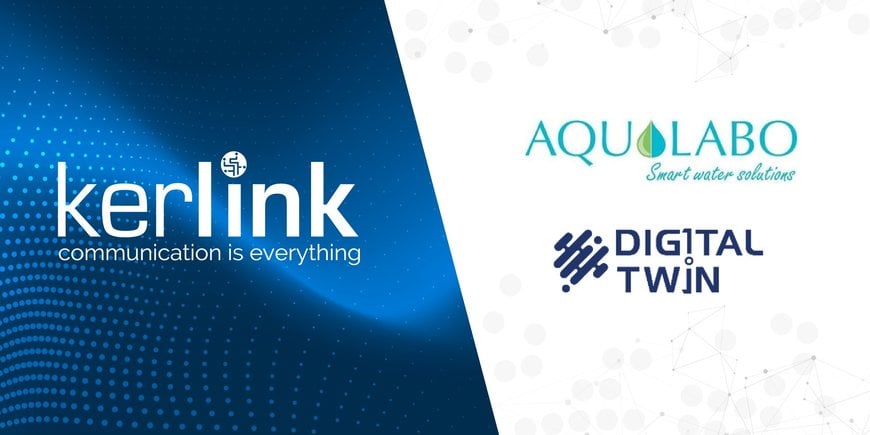Digital Twin Services, Aqualabo and Kerlink Demonstrate LoRaWAN System to Monitor Seawater Quality in Mauritius
A custom-designed Internet of Things (IoT) LoRaWAN-based solution deployed in Mauritius is providing government agencies and water-science specialists access to continuous data on key water-quality parameters.

The monitoring system, a proof of concept retained as part of the government-funded Blue Resilience innovation program, was designed and installed by Digital Twin Services (DTS), a Mauritian technology solutions provider specialized in Industry 4.0 solutions. DTS is integrating products from two French IoT companies, Aqualabo – a designer, manufacturer, and supplier of a wide range of water analysis and testing devices and instruments – and Kerlink (AKLK – FR0013156007) – a specialist in solutions dedicated to the Internet of Things (IoT).
On July 25, 2020, a Japanese bulk carrier called MW Wakashio ran aground on a coral reef southeast of Mauritius, near Pointe d’Esny, a wildlife sanctuary in the India Ocean. It released more than 1,000 tons of fuel oil into the crystal-clear waters of the island, and formed an oil spill on the coast of the archipelago.
The spill caused the worst maritime pollution in the history of Mauritius, which depends heavily on its waters for its food security and ecotourism. Moreover, it is an area that has some of the most beautiful coral reefs in the world. The southeast coast of Mauritius includes Pointe d’Esny, rich in mangroves, and Blue Bay, known for its coral reefs and classified under the Ramsar Convention on Wetlands. Following the spill, the government launched the Blue Resilience program, which was a call for innovative proposals to better equip Mauritian authorities to manage the island’s “Blue Economy” and its resources.
The success of this proof-of-concept laid the foundation for setting up an island-wide, IoT real-time online monitoring system for seawater quality, as described in the Mauritian government’s request for proposals issued in February 2022. The project includes the appointment of a consulting firm to guide authorities on the establishment of an IoT-based Lagoon Water Quality Index (LWQI). This will, in turn, promote the maintenance and management of beaches to support the local economy through increasing tourism and related business activities. It also will provide officials with a continuous outlook on the quality of beaches by ranking beach water quality as “excellent”, “good”, “fair” or “bad”.
The first site of the pilot project was installed in October 2021 in Pointe aux Feuilles on the east coast of the island, and a second pilot site is expected to be deployed in the coming months in Albion on the west coast.
The pilot monitoring installation uses several stand-alone communicating modules from Aqualabo’s AquaMod range, digital sensors consisting of a stand-alone LoRaWAN® wireless waterproof module and an antenna, such as:
- OPTOD Titanium, for measuring dissolved oxygen and temperature,
- NTU sensor, for measuring turbidity,
- C4E sensor for measuring conductivity and salinity,
- PHEHT sensor for measuring pH,
- EHAN sensors for measuring redox potential, and
- A HYDROCLEAN system for automatic cleaning of systems for the oxygen and turbidity sensors along the coral reefs.
The system transfers continuous seawater data over a private IoT network by Kerlink’s industrial grade Wirnet iStation outdoor gateways. Data are then instantly and securely transferred to a private IoT platform in the government’s datacenter. The data of various critical seawater parameters (temperature, pH, redox potential, conductivity, salinity, turbidity, and dissolved-oxygen level) are displayed in the form of a dynamic graph/timeline that highlights targeted levels and critical thresholds for government specialists’ analysis and decision-making.
“The integration of the complete end-to-end solution was simple and quick, via the use of a private LoRa Network Server (LNS),” said Aqualabo CMO Severine Goulette. “Aqualabo’s sensors and devices ensure 24/7 monitoring to analyze key water-quality parameters for the continuous efforts to save the coral reef and improve the overall water quality.”
“The quick and simple installation of this pilot project has underscored LoRaWAN’s reliability, versatility, and suitability for this kind of seawater-monitoring project, which is one of our primary objectives as an island nation. We were very confident with the proposed solution thanks to the products and expertise of our partners Aqualabo and Kerlink,” said Johan Venkatasawmy, CEO of Digital Twin Services in Mauritius.
“Kerlink’s Wirnet iStations have shown their robustness, performance, and flexibility worldwide to support LoRaWAN-powered wildlife and natural-resource protection projects in very diverse environments,” said Benjamin Maury, Kerlink’s head of international partnerships. “Collaborating with Digital Twin Services and Aqualabo in this vital project to help preserve Mauritius’s pristine setting is another strong example of Kerlink’s commitment to protect the environment.”
www.kerlink.com

